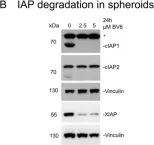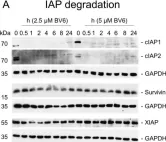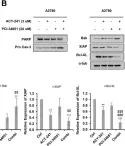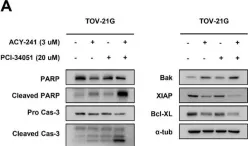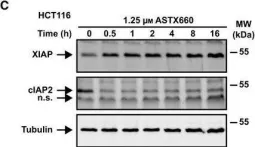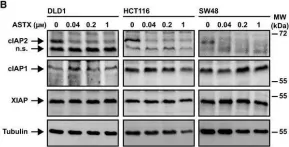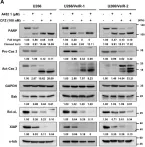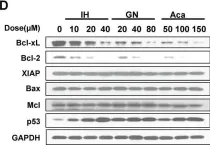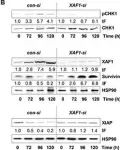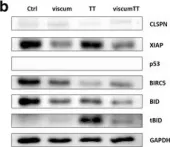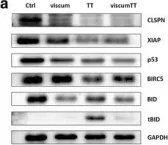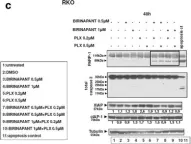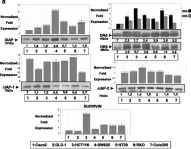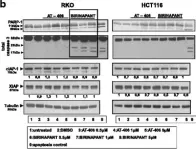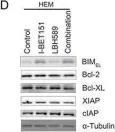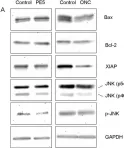Mitochondrial outer membrane permeabilisation (MOMP) is often essential for apoptosis, by enabling cytochrome c release that leads to caspase activation and rapid cell death. Recently, MOMP has been shown to be inherently pro-inflammatory with emerging cellular roles, including its ability to elicit anti-tumour immunity. Nonetheless, how MOMP triggers inflammation and how the cell regulates this remains poorly defined. We find that upon MOMP, many proteins localised either to inner or outer mitochondrial membranes are ubiquitylated in a promiscuous manner. This extensive ubiquitylation serves to recruit the essential adaptor molecule NEMO, leading to the activation of pro-inflammatory NF-κB signalling. We show that disruption of mitochondrial outer membrane integrity through different means leads to the engagement of a similar pro-inflammatory signalling platform. Therefore, mitochondrial integrity directly controls inflammation, such that permeabilised mitochondria initiate NF-κB signalling.
© 2024. The Author(s).
Product Citations: 60
In The EMBO Journal on 1 March 2024 by Vringer, E., Heilig, R., et al.
-
Cell Biology
-
Immunology and Microbiology
In Cell Death & Disease on 28 October 2023 by Fitzgerald, M. C., O'Halloran, P. J., et al.
Medulloblastoma is the most common malignant paediatric brain tumour, representing 20% of all paediatric intercranial tumours. Current aggressive treatment protocols and the use of radiation therapy in particular are associated with high levels of toxicity and significant adverse effects, and long-term sequelae can be severe. Therefore, improving chemotherapy efficacy could reduce the current reliance on radiation therapy. Here, we demonstrated that systems-level analysis of basal apoptosis protein expression and their signalling interactions can differentiate between medulloblastoma cell lines that undergo apoptosis in response to chemotherapy, and those that do not. Combining computational predictions with experimental BH3 profiling, we identified a therapeutically-exploitable dependence of medulloblastoma cells on BCL-XL, and experimentally validated that BCL-XL targeting, and not targeting of BCL-2 or MCL-1, can potentiate cisplatin-induced cytotoxicity in medulloblastoma cell lines with low sensitivity to cisplatin treatment. Finally, we identified MCL-1 as an anti-apoptotic mediator whose targeting is required for BCL-XL inhibitor-induced apoptosis. Collectively, our study identifies that BCL-XL and MCL-1 are the key anti-apoptotic proteins in medulloblastoma, which mediate distinct protective roles. While BCL-XL has a first-line role in protecting cells from apoptosis basally, MCL-1 represents a second line of defence that compensates for BCL-XL upon its inhibition. We provide rationale for the further evaluation of BCL-XL and MCL-1 inhibitors in the treatment of medulloblastoma, and together with current efforts to improve the cancer-specificity of BCL-2 family inhibitors, these novel treatment strategies have the potential to improve the future clinical management of medulloblastoma.
© 2023. The Author(s).
-
WB
-
Homo sapiens (Human)
-
Cell Biology
Mitochondrial outer membrane integrity regulates a ubiquitin-dependent NF-κB inflammatory response
Preprint on BioRxiv : the Preprint Server for Biology on 21 September 2023 by Vringer, E., Riley, J. S., et al.
Mitochondria are often essential for apoptosis through mitochondrial outer membrane permeabilization (MOMP). This central event enables cytochrome c release leading to caspase activation and rapid cell death. Recently, MOMP has been shown to be inherently pro-inflammatory, for instance, by enabling mitochondrial DNA-dependent activation of cGAS-STING signalling. Alongside having emerging functions in health and disease, MOMP associated inflammation can also elicit anti-tumour immunity. Nonetheless, how MOMP triggers inflammation and how the cell counteracts this remains poorly defined. We find that upon MOMP, mitochondria are ubiquitylated in a promiscuous manner targeting proteins localised to both inner and outer mitochondrial membranes. Mitochondrial ubiquitylation serves to recruit the essential adaptor molecule, NEMO, leading to activation of pro-inflammatory NF-κB signalling. We find that disruption of mitochondrial outer membrane integrity through different means leads to engagement of a similar pro-inflammatory signalling platform. Thus, mitochondrial integrity directly controls inflammation, such that permeabilised mitochondria initiate NF-κB signalling. This event may be important for the various pathophysiological functions of MOMP-associated inflammation.
-
Cell Biology
-
Immunology and Microbiology
MicroRNAs as Potential Regulators of GSK-3β in Renal Cell Carcinoma.
In Current Issues in Molecular Biology on 11 September 2023 by Murata, M., Bilim, V., et al.
The prognosis of patients with advanced renal cell carcinoma (RCC) has improved with newer therapies, including molecular-targeted therapies and immuno-oncology agents. Despite these therapeutic advances, many patients with metastatic disease remain uncured. Inhibition of glycogen synthase kinase-3β (GSK-3β) is a promising new therapeutic strategy for RCC; however, the precise regulatory mechanism has not yet been fully elucidated. MicroRNAs (miRNAs) act as post-translational regulators of target genes, and we investigated the potential regulation of miRNAs on GSK-3β in RCC. We selected nine candidate miRNAs from three databases that could potentially regulate GSK-3β. Among these, hsa-miR-4465 (miR-4465) was downregulated in RCC cell lines and renal cancer tissues. Furthermore, luciferase assays revealed that miR-4465 directly interacted with the 3' untranslated region of GSK-3β, and Western blot analysis showed that overexpression of miR-4465 significantly decreased GSK-3β protein expression. Functional assays showed that miR-4465 overexpression significantly suppressed cell invasion of A498 and Caki-1 cells; however, cell proliferation and migration were suppressed only in Caki-1 and A498 cells, respectively, with no effect on cell cycle and apoptosis. In conclusion, miR-4465 regulates GSK-3β expression but does not consistently affect RCC cell function as a single molecule. Further comprehensive investigation of regulatory networks is required in this field.
-
Homo sapiens (Human)
-
Cancer Research
In Acta Biochimica et Biophysica Sinica on 19 June 2023 by Chen, R., Wu, X., et al.
Obesity has been reported to promote disordered folliculogenesis, but the exact molecular mechanisms are still not fully understood. In this study, we find that miR-133a is involved in obesity-induced follicular development disorder. After feeding with a high-fat diet (HFD) and fructose water for nine weeks, the mouse body weight is significantly increased, accompanied by an inflammatory state and increased expression of miR-133a in the adipose tissues and ovaries as well as accelerated follicle depletion. Although miR-133a is increased in the fat and ovaries of HFD mice, the increased miR-133a in the HFD ovaries is not derived from exosome transferred from obese adipose tissues but is synthesized by ovarian follicular cells in response to HFD-induced inflammation. In vivo experiments show that intrabursal injection of miR-133a agomir induces a decrease in primordial follicles and an increase in antral follicles and atretic follicles, which is similar to HFD-induced abnormal folliculogenesis. Overexpression of miR-133a modestly promotes granulosa cell apoptosis by balancing the expression of anti-apoptotic proteins such as C1QL1 and XIAP and pro-apoptotic proteins such as PTEN. Overall, this study reveals the function of miR-133a in obesity-induced ovarian folliculogenesis dysfunction and sheds light on the etiology of female reproductive disorders.
-
Immunology and Microbiology
In Cell Death Dis on 28 October 2023 by Fitzgerald, M. C., O'Halloran, P. J., et al.
Fig.1.B

-
WB
-
Homo sapiens (Human)
Collected and cropped from Cell Death Dis by CiteAb, provided under a CC-BY license
Image 1 of 19
In Cells on 15 March 2023 by Särchen, V., Reindl, L. M., et al.
Fig.2.B

-
WB
-
Collected and cropped from Cells by CiteAb, provided under a CC-BY license
Image 1 of 19
In Cells on 15 March 2023 by Särchen, V., Reindl, L. M., et al.
Fig.2.A

-
WB
-
Collected and cropped from Cells by CiteAb, provided under a CC-BY license
Image 1 of 19
In Int J Mol Sci on 3 August 2022 by Kim, J. Y., Han, S. Y., et al.
Fig.3.B

-
WB
-
Collected and cropped from Int J Mol Sci by CiteAb, provided under a CC-BY license
Image 1 of 19
In Int J Mol Sci on 3 August 2022 by Kim, J. Y., Han, S. Y., et al.
Fig.3.A

-
WB
-
Collected and cropped from Int J Mol Sci by CiteAb, provided under a CC-BY license
Image 1 of 19
In FEBS Open Bio on 1 March 2021 by Knoll, G. & Ehrenschwender, M.
Fig.1.C

-
WB
-
Collected and cropped from FEBS Open Bio by CiteAb, provided under a CC-BY license
Image 1 of 19
In FEBS Open Bio on 1 March 2021 by Knoll, G. & Ehrenschwender, M.
Fig.1.B

-
WB
-
Collected and cropped from FEBS Open Bio by CiteAb, provided under a CC-BY license
Image 1 of 19
In Int J Mol Sci on 29 January 2021 by Lee, S. W., Yeon, S. K., et al.
Fig.5.A

-
WB
-
Homo sapiens (Human)
Collected and cropped from Int J Mol Sci by CiteAb, provided under a CC-BY license
Image 1 of 19
In Sci Rep on 26 July 2018 by Zhang, H. W., Hu, J. J., et al.
Fig.4.D

-
WB
-
Homo sapiens (Human)
Collected and cropped from Sci Rep by CiteAb, provided under a CC-BY license
Image 1 of 19
In Oncotarget on 28 February 2017 by Reich, T. R., Switzeny, O. J., et al.
Fig.2.B

-
WB
-
Homo sapiens (Human)
Collected and cropped from Oncotarget by CiteAb, provided under a CC-BY license
Image 1 of 19
In BMC Complement Altern Med on 7 January 2017 by Kleinsimon, S., Kauczor, G., et al.
Fig.4.B

-
WB
-
Collected and cropped from BMC Complement Altern Med by CiteAb, provided under a CC-BY license
Image 1 of 19
In BMC Complement Altern Med on 7 January 2017 by Kleinsimon, S., Kauczor, G., et al.
Fig.4.A

-
WB
-
Collected and cropped from BMC Complement Altern Med by CiteAb, provided under a CC-BY license
Image 1 of 19
In PLoS One on 28 October 2016 by Fedoseienko, A., Wieringa, H. W., et al.
Fig.4.A

-
WB
-
Homo sapiens (Human)
Collected and cropped from PLoS One by CiteAb, provided under a CC-BY license
Image 1 of 19
In PLoS One on 3 September 2016 by Twardziok, M., Kleinsimon, S., et al.
Fig.4.B

-
WB
-
Collected and cropped from PLoS One by CiteAb, provided under a CC-BY license
Image 1 of 19
In BMC Cancer on 12 August 2016 by Perimenis, P., Galaris, A., et al.
Fig.4.C

-
WB
-
Homo sapiens (Human)
Collected and cropped from BMC Cancer by CiteAb, provided under a CC-BY license
Image 1 of 19
In BMC Cancer on 12 August 2016 by Perimenis, P., Galaris, A., et al.
Fig.1.A

-
WB
-
Homo sapiens (Human)
Collected and cropped from BMC Cancer by CiteAb, provided under a CC-BY license
Image 1 of 19
In BMC Cancer on 12 August 2016 by Perimenis, P., Galaris, A., et al.
Fig.2.B

-
WB
-
Homo sapiens (Human)
Collected and cropped from BMC Cancer by CiteAb, provided under a CC-BY license
Image 1 of 19
In Oncotarget on 28 August 2015 by Heinemann, A., Cullinane, C., et al.
Fig.4.D

-
WB
-
Collected and cropped from Oncotarget by CiteAb, provided under a CC-BY license
Image 1 of 19
In BMC Cancer on 11 January 2011 by Castro, J., Ribó, M., et al.
Fig.6.A

-
WB
-
Homo sapiens (Human)
Collected and cropped from BMC Cancer by CiteAb, provided under a CC-BY license
Image 1 of 19

